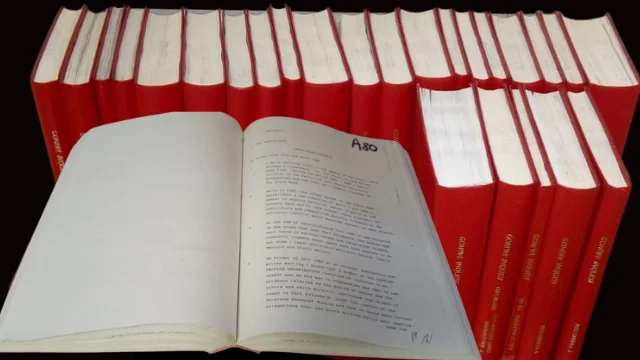
In 2020, the Foundation for Human Rights and the National Prosecuting Authority (NPA approached the Rhodes University Library to make accessible the Zietsman/Goniwe Inquest documentation, archived at the Cory Library for Humanities Research.
The collection documents the public enquiry into the painful, and deeply unjust deaths of four anti-apartheid activists in 1985, known as the ‘Cradock Four’. The collection has been digitised to make it accessible to the public as part of the Rhodes Library’s national heritage collection.
Following the digitisation of the inquest collection by a team of dedicated specialists from Sabinet, Rhodes University entrusted an experienced cataloguing professional and metadata specialist, Ms Martha de Waal, to create descriptive metadata for the digitised files.
The archived and digital collection of court proceedings, records of evidence, newspaper clippings, official statements and investigation reports, minutes of meetings and other documentation related to the case, will be available as a reference to scholars interested in studying the rich history of the Eastern Cape.
Masters in Journalism and Media Studies student, Luvo Mnyobe, spoke to Ms De Waal about the significance of the project.
Mnyobe: Who were the Cradock Four?
De Waal: The ‘Cradock Four’ is a collective name given to the four anti-apartheid activists Matthew Goniwe, Fort Calata, Sicelo Mhlauli, and Sparrow Mkonto. The four were arrested at a roadblock, just outside of Port Elizabeth, on route to Cradock, on 27 June 1985. They were assaulted and murdered by individuals from the South African Security Branch, also called Special Branch, a unit of the South African Police (SAP) during the Apartheid era.
Following the unnatural and mysterious circumstances of the deaths, two inquests were conducted to investigate the incident. The first was held between 1987 and 1989, handled by Magistrate E. de Beer, who found that the four were killed by “unknown persons” and found that no one could be prosecuted.
In 1992, now deceased President F.W. de Klerk ordered another inquest which was presided over by Judge Neville Zietsman. This inquest concluded in 1993 that the SAP was responsible for the deaths, but since no individuals were named, once again no one was prosecuted for the deaths.
At the Truth and Reconciliation Commission in 1999, six former police officers were called upon to answer questions relating to the deaths of the Cradock Four, but none gave substantive evidence, and none were granted amnesty.
M: Why did Rhodes University move to digitalise the Cradock Four inquest manuscripts?
DW: Rhodes Library, through its branch Library, the Cory Library for Humanities Research, endeavours to ensure that collections:
- are representative of the collective history of the Eastern Cape;
- allow for the opportunity to contribute to social justice and the correcting of historical ‘facts’ or perceptions;
- and provide the means to ensure that justice can provide some answers to the families and friends affected by incidents such as the ‘Cradock Four.’
Digitisation of the physical collection will make the documentation easily accessible to the public.
M: How did you go about digitising the manuscripts?
DW: To preserve the unique and valuable Cradock Four print collection, a team of dedicated digitisation specialists from Sabinet (https://www.sabinet.co.za/digitisation), was commissioned to digitise the original material. The digitised documents consist of 13 PDF files covering 40 print volumes of court records, plus 14 PDF files, covering additional printed documents and memoranda relating to the case.
These digitised files were uploaded to the Rhodes University Digital Commons (https://vital.seals.ac.za) as part of a series called Apartheid, the struggle, and the people.
Descriptive metadata elements, such as titles, names, dates, as well as subject metadata were used to enable easy discovery of both the print and digitised documents.
M: How long did the project take and when will it be available to the public?
DW: The descriptive cataloguing project will be concluded early in 2022. The physical collection is housed at the Cory Library for Humanities Research, while access to the digital files will be provided through the Rhodes University Digital Commons.

